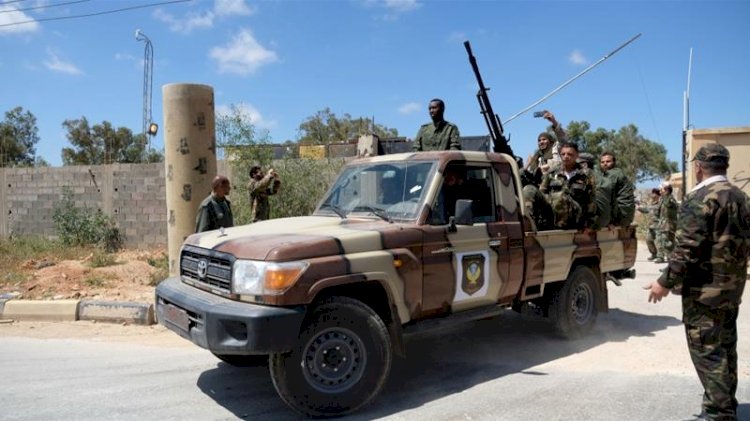Libya's renegade commander Khalifa Haftar announces Ramadan truce

Libyan renegade military commander Khalifa Haftar has said his forces would cease hostilities during the Muslim holy month of Ramadan following international calls for a truce in the war-torn North African nation.
Ahmed Mismari, spokesman for Haftar's self-styled Libyan National Army (LNA), said in a television broadcast on Thursday the ceasefire came at the request of the international community and "friendly countries".
The announcement came after pro-Haftar forces suffered a series of setbacks in recent weeks in their year-long campaign to seize Tripoli with forces loyal to the United Nations-recognised Government of National Accord (GNA) expelling them from two key coastal cities west of the capital. Explosions in the centre of Tripoli were heard after the announcement.
A source from GNA said it would not adhere to the truce. Mismari warned violations by the GNA would be met with an "immediate and harsh response". Oil-rich Libya has been engulfed in chaos since 2011 when longtime leader Muammar Gaddafi was killed in a NATO-backed uprising.
It is now split between two rival administrations: The Tripoli-based GNA and the eastern-bsaed House of Representatives allied to Haftar. Last week, the UN, European Union and several countries called for both sides to lay down their arms during Ramadan.
Sami Hamdi, the editor-in-chief of the International Interest, a current affairs analysis magazine, told Al Jazeera that Haftar was announcing the truce now "because the tide of the Tripoli offensive has altered".
"Now his two main basis, the spine of the Tripoli offensive is under siege - that's al-Watiya airbase where the supplies come in from the east and Tarhuna," he said.
Hamdi added: "It seems Haftar is concerned that he might not be able to hold on to them for much longer. But more importantly, Haftar believes that domestically the situation needs attention. He needs to cement his authority in the east."
He said Haftar wanted to use the time "to clean up the political mess in the east". "He made a unilateral declaration that he would rule Libya by a popular mandate. It was done to cut off any potential opposition that might take advantage of the reversal in the offensive."
Military dictatorship
Backed by Turkey, GNA troops are now encircling Haftar's main rear base at Tarhounah, 60km (39 miles) southeast of the capital.
Since launching the Tripoli offensive in April last year, several ceasefires between Haftar's forces and the GNA have fallen through, with both sides accusing the other of violations. Haftar's opponents accuse him of wanting to establish a new military dictatorship in the country.
On Monday, he claimed he had "a popular mandate" to govern, declaring a key 2015 political deal over and vowing to press his assault to seize Tripoli. The GNA responded by accusing Haftar of seeking to stage a new coup and called the attempt a "farce".
"What the war criminal Haftar said was a coup on the democratic path, not new but a continuation of his failed coups and to cover up his repeated defeats," the GNA said in a statement. Haftar, 76, receives support from the United Arab Emirates (UAE), Egypt and Russia.
On Wednesday, a UAE delegation reportedly landed in Sudan to shore up support and recruit fighters for Haftar's forces. The delegation, led by UAE National Security Advisor Tahnoun bin Zayed, discussed ways of supporting Haftar in light of the setback his LNA is facing.
In a 376-page report submitted to the UN Security Council in December, a panel of experts warned the presence of Sudanese fighters - which analysts estimate at anywhere between 1,000 and 3,000 - had become a notable feature of the Libyan conflict and it risked destabilising the country further.
The LNA has for weeks been shelling Tripoli in a campaign of bombardment that has drawn repeated rebukes from the UN. Hospitals in parts of Tripoli held by the GNA have repeatedly been hit by shelling in recent weeks, despite the threat to Libya posed by the coronavirus.
The Human Rights Watch said on Wednesday the UAE had last year targeted a biscuit factory with a drone strike in support of the LNA, killing eight civilians in an attack it called "apparently unlawful". The UAE and the LNA have not commented on that report.
